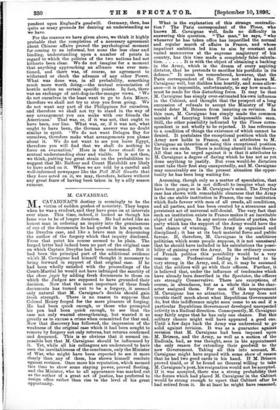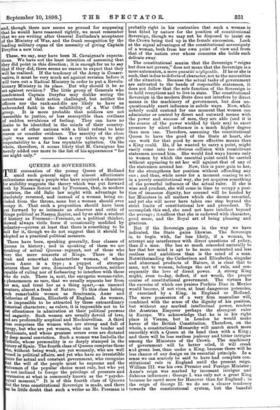M. CAVAIGNAC.
MCAVAIGNAC'S destiny is seemingly to be the • victim of sudden gushes of notoriety. They began when he was a student, and they have gone on at intervals ever since. This time, indeed, it looked as though his fame was to be of longer duration. He had acted like an honest man in ordering an inquiry into the genuineness of one of the documents he had quoted in his speech on the Dreyfus case, and like a brave man in denouncing the author of the forgery which that inquiry disclosed. From that point his course seemed to be plain. The forged letter had indeed been no part of the original case on which Captain Dreyfus had been condemned. But it had been the principal part of the additional evidence which M. Cavaignac had himself thought it necessary to bring forward in support of that original case. If he had been wholly satisfied with the proceedings of the Court-Martial he would not have infringed the sanctity of the chose jagee by adding fresh documents to those on which the Judges are supposed to have grounded their decision. Now that the most important of these fresh documents has turned out to be a forgery, it seemed only natural that M. Cavaignac's doubts should gain fresh strength. There is no reason to suppose that Colonel Henry forged for the mere pleasure of forging. He had been quick enough, or those who prompted his pen had been quick enough, to see that the case not only wanted strengthening, but wanted it so greatly as to excuse a crime when committed for that end. Now that discovery has followed, the impression of the weakness of the original case which it had been sought to remove by forgery not only returns, but returns confirmed and deepened. This is so obvious that it seemed im- possible but that M. Cavaignac should be influenced by it. Yet, while all his colleagues are understood to have seen the inevitableness of the conclusion, only the Minister of War, who might have been expected to see it more clearly than any of them, has shown himself resolute against revision. Once more his reputation, which seemed this time to show some staying power, proved fleeting, and the Minister, who to all appearance was marked out as the author of a great act of justice, has preferred to resign office rather than rise to the level of his great Opportunity. What is the explanation of this strange contradic- tion? The Paris correspondent of the Times, who knows M. Cavaignac well, finds no difficulty in answering this question. "The man," he says, "who whenever he has taken office has imperilled the normal and regular march of affairs in France, and whose impatient ambition led him to aim by constant and varied manceuvres at the supreme magistracy of his country, has this time made a completely false calcula- tion It is with the object of obtaining a backing in the Army, which is the dream of every aspiring dictator, that he pretends to sacrifice his portfolio in its defence." It must be remembered, however, that the Paris correspondent of the Times not only knows M. Cavaignac well, but dislikes him heartily, and some allow- ance—it is impossible, unfortunately, to say how much— must be made for this disturbing force. It may be that M. Cavaignac has simply over-estimated his own influence in the Cabinet, and thought that the prospect of a long succession of refusals to accept the Ministry of War would deter M. Brisson from insisting on revision. In this case, M. Cavaignac has simply made the common mistake of fancying himself the indispensable man. Still, the other possibility indicated by the Times corre- spondent is not wholly to be rejected. It has reference to a condition of things the existence of which cannot be denied. It postulates the exceptional position which the Army now holds in France, and it attributes to M. Cavaignac an intention of using this exceptional position for his own ends. There is nothing absurd in this theory. All that can be urged against it is that it attributes to M. Cavaignac a degree of daring which he has not as yet done anything to justify. But even would-be dictators must take their first step unexpectedly, and M. Cavaignac may conceivably see in the present situation the oppor- tunity he has been long waiting for.
Assuming, though only as a matter of speculation, that this is the case, it is not difficult to imagine what may have been going on in M. Cavaignac's mind. The Dreyfus case has shown with remarkable clearness that the Army is the one stable institution in France, the one institution which finds favour with men of all creeds, all conditions, and all parties, and has been created by a strenuous and persistent act of universal self-denial. The very fact that such an institution exists in France makes it an inevitable object of intrigue. In any serious collision of parties, the party which has the support of the Army would have the best chance of winning. The Army is organised and disciplined ; it has at its back material force and public favour. If, therefore, M. Cavaignac is the ambitious politician which some people suppose, it is not unnataral that he should have included in his calculations the possi- bility of gaining over the Army. In the ordinary course of French politics this possibility would be a very remote one. Professional feeling is believed to be very strong in the Army, and, if so, it may be assumed that the soldiers will go with their officers. Further, it is believed that, under the influence of tendencies which have already been described in the Spectator, the officers are strongly Conservative. There are exceptions, of course, in abundance, but as a whole this is the char- acter assigned them. For men of this temperament M. Cavaignac has no attraction. The Army does not trouble itself much about what Republican Governments do, but this indifference might soon come to an end if a particular Republican Government developed unexpected activity in a Radical direction. Consequently, M. Cavaignac may fairly argue that he has only one chance. But this solitary chance might well have appeared a good one. -Until a few days back the Army was understood to go solid against revision. It was as a guarantee against revision that M. Cavaignac had been imposed upon M. Brisson, and the Army, as well as a section of the Radicals, had, as was thought, seen in his appointment the only reason for extending their goodwill to the new Government. Taking all this into account, M. Cavaignac might have argued with some show of reason that he had two good cards in his hand. If M. Brisson proved timid, or if he found no General willing to take M. Cavaignac's post, his resignation would not be accepted. If it was accepted, there was a strong probability that the forces which had placed M. Cavaignac in the Cabinet would be strong enough to upset that Cabinet alter he had retired from it. So at least he might have reasoned, and, though there now seems no ground for supposing that he would have reasoned rightly, we must remember that we are writing after General Zurlinden's acceptance of the Ministry of War, and the frank recognition by the leading military organ of the necessity of giving Captain Dreyfus a new trial.
These, we say, may have been M. Cavaignac's expecta- tions. We have not the least intention of assuming that they did point in this direction; it is enough for us to say that if they did, there seems no reason to expect that they will be realised. If the tendency of the Army is Conser- vative, it must be very much set against revision before it will turn out a Radical Ministry in order to put a Revolu- tionary Ministry in its place. But why should it be so set against revision ? The little group of Generals who condemned Captain Dreyfus may dislike seeing the correctness of their action challenged, but neither the officers nor the rank-and-file are likely to have an unbounded faith in the infallibility of a War Office group. It is more probable that soldiers are not insensible to justice, or less susceptible than civilians of sudden revulsions of feeling. They can have no desire to be identified in the minds of their country- men or of other nations with a blind refusal to hear reason or consider evidence. The sanctity of the chose uge'e was never more than a cry taken up to give espectability to a far less reputable agitation. On the whole, therefore, it seems likely that M. Cavaignac has merely added one more to the list of his appearances "for one night only."



































 Previous page
Previous page